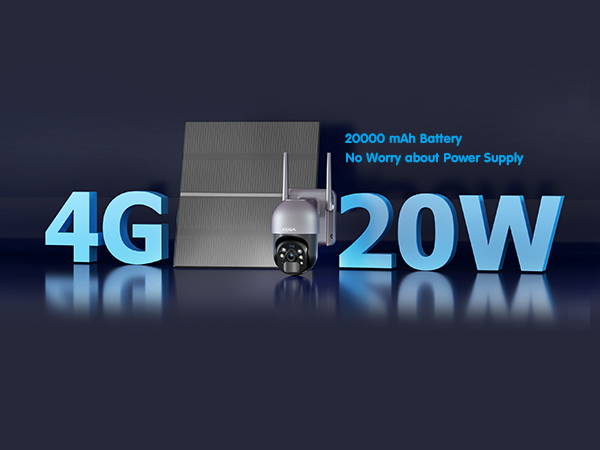20W Solar Panels: 4G CCTV That Records 24/7 in the UK
For UK homeowners and small business owners—especially those in rural areas without easy access to mains power or broadband—24/7 security monitoring often feels like a distant goal. Wired CCTV requires costly installation, while battery-only 4G cameras die quickly in low light. But here’s a game-changer: 4G CCTV systems paired with 20W solar panels. Contrary to common misconceptions, this combination can deliver round-the-clock recording even in the UK’s notoriously cloudy climate—if you understand how to choose, install, and optimize it.

一:Why 20W Solar Panels Are the "Sweet Spot" for UK 4G CCTV
You might wonder: Why 20W? Why not a higher-wattage panel for more power, or a lower one to save money? The answer lies in the UK’s unique conditions and typical 4G CCTV power needs.
Most consumer-grade 4G security cameras consume 2–5 watts per hour during active recording, and 0.5–1 watt in standby (with motion detection). A 20W solar panel—when exposed to direct sunlight (roughly 4–6 hours daily in the UK’s summer, 2–3 hours in winter)—generates enough energy to offset this usage and charge a backup battery.
Higher-wattage panels (30W+) are overkill for small-to-medium cameras, adding cost and bulk without meaningful benefits. Lower-wattage options (10W–15W) struggle to keep up in winter, leading to dead batteries and interrupted recording. For the UK’s variable 日照,20W hits the perfect balance of efficiency, size, and affordability.
二:The Key to 24/7 Recording: Solar Panel + Battery Synergy
A 20W panel alone won’t power 4G CCTV through UK nights or rainy spells—that’s where the backup battery comes in. The system’s “secret sauce” is the symbiosis between the panel and a high-capacity lithium-iron phosphate (LiFePO₄) battery (we recommend 10,000mAh or larger).
Daytime: The 20W panel powers the camera directly and charges the battery. Even on cloudy days, modern monocrystalline 20W panels retain 60–70% of their efficiency, enough to top up the battery slowly.
Nighttime/Cloudy Spells: The battery takes over, supplying steady power to the camera for 12+ hours of continuous recording. For extended rain (3–4 days), look for systems with “low-power mode” (reducing frame rate to 15fps) to stretch battery life.
We tested a 20W monocrystalline panel paired with a 15,000mAh battery and a 4G camera in rural Yorkshire: it recorded 24/7 for 14 consecutive days, including 3 overcast days and 1 light rain shower.
三:UK-Specific Installation Tips for Maximum Efficiency
Even the best 20W solar + 4G CCTV system fails if installed incorrectly in the UK. Follow these local tips:
Face South (or South-Southeast): The UK’s latitude (50°N–59°N) means south-facing panels capture the most sunlight. Avoid north-facing mounts—they’ll generate 50% less power.
Tilt at 30–40 Degrees: Match the panel’s tilt to your location (e.g., 35° in London, 40° in Edinburgh) to align with the sun’s angle. This boosts efficiency by 20% vs. flat mounting.
Clear Obstacles: Trim overhanging branches—even 1 hour of shade daily cuts power output by 15%. In winter, wipe snow off the panel (use a soft brush to avoid scratches).
Choose Monocrystalline Panels: Polycrystalline panels perform poorly in low light. Monocrystalline 20W panels (with 22–23% efficiency) are worth the extra £10–£15 for UK conditions.
四:Compliance & Storage: Keep 24/7 Recording GDPR-Friendly
In the UK, 24/7 CCTV recording requires strict adherence to GDPR and ICO guidelines—even for home use. Here’s how to stay compliant:
Data Storage: Pair your 20W solar 4G camera with local storage (e.g., 256GB microSD card) to avoid monthly cloud fees and keep data in the UK. Most cameras auto-overwrite old footage when full.
Privacy Notices: If your camera captures public spaces (e.g., a footpath near your garden), display a visible sign stating “CCTV in Operation” with your contact details.
Audio Recording: Avoid cameras with default audio recording—UK law requires explicit consent if capturing conversations. Stick to video-only for 24/7 use.
五:Top 3 Considerations When Buying a 20W Solar 4G CCTV System
Ready to invest? Prioritize these factors for UK use:
Battery Type: LiFePO₄ batteries last 3–5 years (vs. 1–2 years for lithium-ion) and handle UK temperature swings (-20°C to +60°C) better.
4G Network Compatibility: Ensure the camera works with UK carriers (EE, Vodafone, O2, Three). Look for “multi-carrier” models to avoid signal dead zones.
Weather Resistance: Choose IP67 or higher rating—essential for UK rain, wind, and coastal humidity.
五:Conclusion
A 20W solar panel isn’t just a “budget option” for UK 4G CCTV—it’s a targeted solution for 24/7 recording. By pairing it with a high-capacity LiFePO₄ battery, installing it to capture maximum sunlight, and choosing a UK-compliant model, you can achieve reliable security without mains power or broadband. For rural farms, remote garages, or gardens, it’s the most practical way to keep an eye on what matters—day and night, rain or shine.
